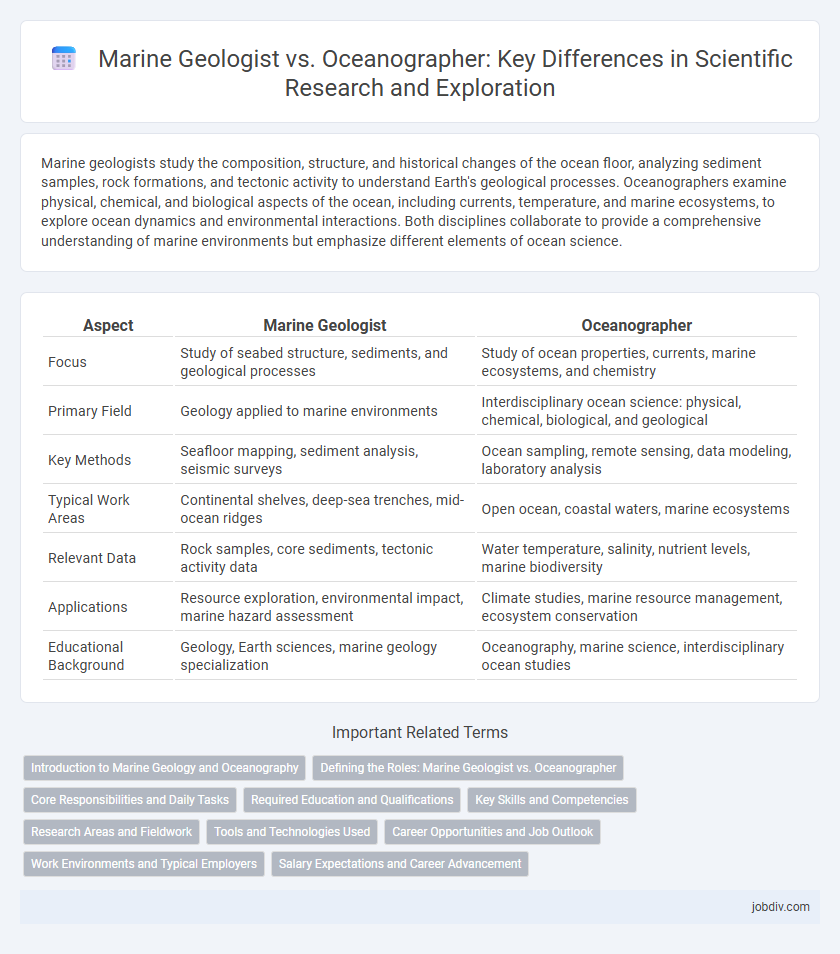Marine geologists study the composition, structure, and historical changes of the ocean floor, analyzing sediment samples, rock formations, and tectonic activity to understand Earth's geological processes. Oceanographers examine physical, chemical, and biological aspects of the ocean, including currents, temperature, and marine ecosystems, to explore ocean dynamics and environmental interactions. Both disciplines collaborate to provide a comprehensive understanding of marine environments but emphasize different elements of ocean science.
Table of Comparison
| Aspect | Marine Geologist | Oceanographer |
|---|---|---|
| Focus | Study of seabed structure, sediments, and geological processes | Study of ocean properties, currents, marine ecosystems, and chemistry |
| Primary Field | Geology applied to marine environments | Interdisciplinary ocean science: physical, chemical, biological, and geological |
| Key Methods | Seafloor mapping, sediment analysis, seismic surveys | Ocean sampling, remote sensing, data modeling, laboratory analysis |
| Typical Work Areas | Continental shelves, deep-sea trenches, mid-ocean ridges | Open ocean, coastal waters, marine ecosystems |
| Relevant Data | Rock samples, core sediments, tectonic activity data | Water temperature, salinity, nutrient levels, marine biodiversity |
| Applications | Resource exploration, environmental impact, marine hazard assessment | Climate studies, marine resource management, ecosystem conservation |
| Educational Background | Geology, Earth sciences, marine geology specialization | Oceanography, marine science, interdisciplinary ocean studies |
Introduction to Marine Geology and Oceanography
Marine geology studies the structure, composition, and processes of the ocean floor, focusing on plate tectonics, sedimentology, and underwater volcanic activity. Oceanography encompasses the broader study of ocean systems, including physical properties, chemical composition, biological ecosystems, and ocean dynamics. Both disciplines integrate geophysical data and environmental analysis to understand marine environments and their interactions with Earth's systems.
Defining the Roles: Marine Geologist vs. Oceanographer
Marine geologists specialize in studying the composition, structure, and processes of the seafloor and sub-seafloor, analyzing sediment samples, tectonic activity, and marine mineral deposits. Oceanographers investigate physical, chemical, biological, and geological aspects of the ocean, encompassing water properties, marine ecosystems, and ocean circulation patterns. The primary distinction lies in marine geologists' emphasis on solid earth materials beneath the ocean, whereas oceanographers broadly examine ocean dynamics and marine environments.
Core Responsibilities and Daily Tasks
Marine geologists analyze seabed composition, sediment layers, and tectonic activity to understand Earth's geological history and natural resources beneath the ocean floor. Oceanographers study physical, chemical, biological, and geological properties of the ocean, including currents, marine life, and water chemistry, to monitor and predict ocean behavior and ecosystems. Daily tasks for marine geologists include collecting seismic, magnetic, and sediment samples, while oceanographers often deploy sensors, conduct water sampling, and analyze oceanographic data.
Required Education and Qualifications
Marine geologists typically require a bachelor's degree in geology or earth sciences, followed by a master's or Ph.D. specializing in marine geology, with coursework in sedimentology, geophysics, and paleontology. Oceanographers pursue degrees in oceanography, marine science, or related disciplines, often emphasizing chemical, biological, or physical oceanography, and advanced research skills acquired through graduate programs. Both fields demand strong analytical skills, proficiency in data analysis software, and fieldwork experience in marine environments for career advancement.
Key Skills and Competencies
Marine geologists specialize in analyzing seabed structures, sediment composition, and tectonic activity using skills in geophysics, sedimentology, and seismic data interpretation. Oceanographers focus on understanding ocean currents, marine ecosystems, and chemical properties through expertise in physical oceanography, marine biology, and chemical oceanography. Both professions require strong analytical abilities, proficiency in data modeling, and field research techniques to study marine environments effectively.
Research Areas and Fieldwork
Marine geologists specialize in studying the composition, structure, and processes of the ocean floor, including sediment analysis, plate tectonics, and submarine volcanism. Oceanographers research physical, chemical, biological, and geological aspects of the ocean, with fieldwork often involving water sampling, marine organism observation, and ocean current measurements. Both conduct extensive fieldwork using research vessels, submersibles, and remote sensing technology to gather data critical for understanding marine environments.
Tools and Technologies Used
Marine geologists utilize seismic reflection profilers, sub-bottom profilers, and sediment corers to analyze seabed structures and sediment composition. Oceanographers employ remote sensing satellites, autonomous underwater vehicles (AUVs), and conductivity-temperature-depth (CTD) sensors to monitor ocean circulation, temperature, and salinity. Both disciplines integrate Geographic Information Systems (GIS) for spatial data analysis, enhancing precision in marine environment studies.
Career Opportunities and Job Outlook
Marine geologists specialize in studying the Earth's seabed, including sediment composition and tectonic activity, leading to career opportunities in environmental consulting, oil and gas exploration, and academic research. Oceanographers analyze physical, chemical, and biological processes in oceans, creating job prospects in marine conservation, climate research, and government agencies like NOAA. Both fields offer robust job outlooks driven by growing interest in climate change, natural resource management, and marine ecosystem preservation.
Work Environments and Typical Employers
Marine geologists typically conduct research in coastal regions, offshore platforms, and academic institutions, analyzing seabed structures and sediment samples. Oceanographers work in diverse environments including research vessels, government agencies, and environmental consultancies, studying ocean currents, ecosystems, and chemical properties. Both professions frequently collaborate with universities, marine institutes, and federal organizations like NOAA for data collection and analysis.
Salary Expectations and Career Advancement
Marine geologists typically earn a median annual salary of approximately $70,000, reflecting their specialized expertise in earth materials beneath the ocean floor, while oceanographers have a salary range around $65,000 to $90,000 depending on their focus in biological, physical, or chemical oceanography. Career advancement for marine geologists often involves progressing from field research roles to senior geological consultancy or academic positions, whereas oceanographers may advance into leadership roles in marine research institutions, environmental policy, or governmental agencies. Both fields offer opportunities for increased earnings through gaining advanced degrees such as a Ph.D., publishing significant research, and securing grants for extensive oceanographic projects.
Marine Geologist vs Oceanographer Infographic

 jobdiv.com
jobdiv.com